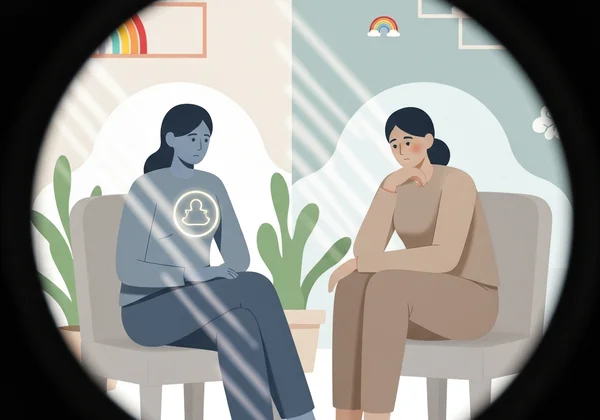Kink Test & Mental Health: Discovering Your Sexual Preferences Safely
October 27, 2025 | By Ethan Cole
Welcome to a journey where self-discovery and desire meet peace of mind. Exploring your sexual preferences, often called "kinks," can be an empowering and deeply fulfilling experience. Yet, it's completely natural for questions about mental wellbeing to surface along the way. How can you explore your desires while prioritizing your peace of mind? This guide is here to help you navigate the intersection of kink, sexuality, and mental health, ensuring your path to self-acceptance is both healthy and safe. A great first step is to discover your desires with a tool designed for private exploration.

The Kink & Mental Health Connection: Debunking Myths
For decades, society has viewed any deviation from "vanilla" sexuality with suspicion. Thankfully, our understanding has evolved. Exploring kink is not just about physical acts; it's a profound psychological landscape involving trust, vulnerability, and communication. It can enhance self-awareness and strengthen bonds between partners when approached with mindfulness and respect for mental wellbeing.
Understanding the psychological impact of kink
Engaging in consensual kink can have surprisingly positive effects on your mental state. For many, it provides a structured outlet for stress and anxiety. The intense focus required during a scene can be a form of mindfulness, grounding you in the present moment. Furthermore, successfully negotiating boundaries and desires builds confidence and communication skills that extend far beyond the bedroom. This journey of self-discovery fosters a deeper connection with your own needs and the needs of your partners.
Kink is not a mental illness: Separating fact from fiction
Let’s be perfectly clear: having kinks is not a sign of a mental disorder. Major psychological and psychiatric associations do not classify consensual, non-harmful BDSM or fetishistic interests as illnesses. They are simply part of the vast spectrum of human sexuality. The key distinction lies in consent and function. A healthy kink is an interest that adds to your life, while a clinical issue would be one that causes significant distress or harm to yourself or others without consent. Embracing your sexual preferences is a valid part of your identity.

Navigating BDSM and Anxiety: Common Concerns & Coping Strategies
It's normal to feel a mix of excitement and apprehension when you start your kink journey. Fear of the unknown, social stigma, or performance anxiety can all create stress. The key is to acknowledge these feelings and develop healthy coping strategies. Remember, this exploration happens at your own pace and on your own terms.
Overcoming fear of judgment and shame in your kink journey
Shame is often the biggest hurdle for curious explorers. We are conditioned to see certain desires as "weird" or "wrong." The first step to overcoming this is education. Learning how common various kinks are can be incredibly validating. A free kink test can provide a private, non-judgmental starting point, showing you a map of your own desires without any external pressure. Finding online communities or supportive friends can also dissolve feelings of isolation and shame, replacing them with a sense of belonging.
Managing pre- and post-exploration jitters or stress
Anticipation before trying something new can cause anxiety. Likewise, the intense emotional and physiological release after a kink scene can sometimes lead to feelings of vulnerability or sadness, often called "sub drop" or "dom drop." The solution is proactive communication and aftercare. Discussing fears beforehand can ease tension. Afterward, engaging in aftercare—cuddling, talking, sharing a snack, or simply being quietly present—is essential for emotional regulation and reaffirming your connection and safety.
Kink as a Path to Sexual Self-Acceptance & Empowerment
When practiced safely, kink can be a powerful tool for personal growth. It provides a unique space to explore parts of yourself that might not have an outlet in daily life. This journey is not just about pleasure; it's about claiming your identity and building a more authentic, integrated self.
Embracing your authentic self through kink exploration
Kink allows you to define pleasure and power on your own terms. Whether you are drawn to dominance, submission, role-playing, or specific fetishes, acknowledging these desires is an act of self-acceptance. It’s about listening to your inner self and honoring what you find. This process helps dismantle shame and builds a stronger, more confident sense of who you are. Understanding your results from an online tool can be a pivotal moment in this self-awareness journey.
How Kink can support healing and personal growth
For some individuals, kink can be a space for healing. Within a framework of enthusiastic consent and trust, exploring themes of power and vulnerability can help people reclaim their sense of agency. It's vital to note that BDSM is not a substitute for therapy. However, for some, the structured nature of scenes and the explicit communication it requires can create a safe environment to process past experiences and build new, positive associations with intimacy and trust.
Building a Foundation for Safe Kink Exploration
Safety is the absolute cornerstone of any healthy kink practice. This includes physical, emotional, and psychological safety. Without a strong foundation built on trust, communication, and clear consent, exploration can become risky. Prioritizing these elements ensures that your journey remains positive and enriching.
The pillars of consent: Enthusiastic, informed, ongoing
True consent is more than just a "yes." It must be enthusiastic, meaning all parties are genuinely excited to participate. It must be informed, meaning everyone understands what they are agreeing to, including potential risks. Finally, it must be ongoing, meaning it can be withdrawn at any time for any reason. This is where safe words become crucial tools for immediate and clear communication.

Why aftercare is crucial for mental wellbeing after play
Aftercare is the non-negotiable cooldown period following a kink scene. It helps participants transition back to their everyday mindsets and process the experience. This practice involves tending to emotional and physical needs and is crucial for maintaining emotional safety. It reinforces that the care and respect between partners exist both inside and outside the dynamic, preventing feelings of abandonment or emotional whiplash.
Setting boundaries and practicing negotiation for emotional safety
Before any play begins, open and honest negotiation is paramount. This conversation involves discussing desires, limits (hard and soft), and expectations. Clearly defining boundaries ensures that everyone feels secure and respected. This is not a one-time conversation; it's a continuous dialogue as your interests and comfort levels evolve. Tools like the kink test for couples can be an excellent way to start this important dialogue.
When to Seek Professional Support: Finding Kink-Aware Therapists
While self-exploration is powerful, there are times when professional guidance is beneficial. If your interests are causing you significant distress, negatively impacting your life, or if you're struggling to navigate them in a healthy way, a therapist can provide support. The key is finding the right professional.
Recognizing the signs you might need therapeutic guidance
Consider seeking help if you feel your desires are compulsive, if your exploration is intertwined with unresolved trauma, or if you consistently feel overwhelming shame or anxiety that you can't manage. A professional can help you unpack these feelings in a safe, confidential space. The goal is not to "cure" your kinks but to integrate them into your life in a healthy, happy way.
Resources for finding inclusive & affirming care providers
When looking for a therapist, search for professionals who identify as "kink-aware" or "sex-positive." These clinicians have specific training and an understanding of BDSM and alternative sexualities. They will approach your experiences with an affirming, non-judgmental perspective, providing you with the effective and respectful care you deserve.

Conclusion
Your journey into understanding your kinks and their connection to your mental health is a personal, valid, and often beautiful one. It's a path toward deeper self-knowledge, better communication, and more authentic relationships. Exploring your desires is not something to fear but an opportunity to embrace your whole self with curiosity and care.
This kink test resource is here to support you with resources, education, and a safe space to begin. Remember, self-discovery is a continuous process, and prioritizing your mental wellbeing is the most important part. Ready to learn more about yourself? Take the Kink Test today to unlock your desires and continue your healthy exploration.
Frequently Asked Questions About Kink & Mental Wellbeing
Is it normal for my kinks to change over time?
Absolutely. Just like any other aspect of your personality, your desires and interests can evolve over time. Life experiences, relationships, and new knowledge can all influence your preferences. It's a sign of growth, and re-evaluating your interests periodically is a healthy practice.
How common are kinks, and am I alone in my desires?
You are far from alone. Studies and surveys consistently show that a significant portion of the population has an interest in or has engaged in some form of BDSM or kink. What might feel unique to you is often shared by a large, diverse community of people.
What is a safe word, and why is it important for mental safety?
A safe word is a pre-agreed-upon word or signal used to immediately stop a scene for any reason. It is a critical tool for mental safety because it gives the person in a submissive or vulnerable role complete control, ensuring their boundaries are never crossed and reinforcing the foundation of trust.
How do I talk to my partner about my kinks without causing anxiety?
Choose a calm, private moment when you're both relaxed. Frame the conversation around shared intimacy and exploration rather than demands. You could suggest taking an online sexual preference test together as a fun, low-pressure way to open the door to conversation and discover what excites you both.